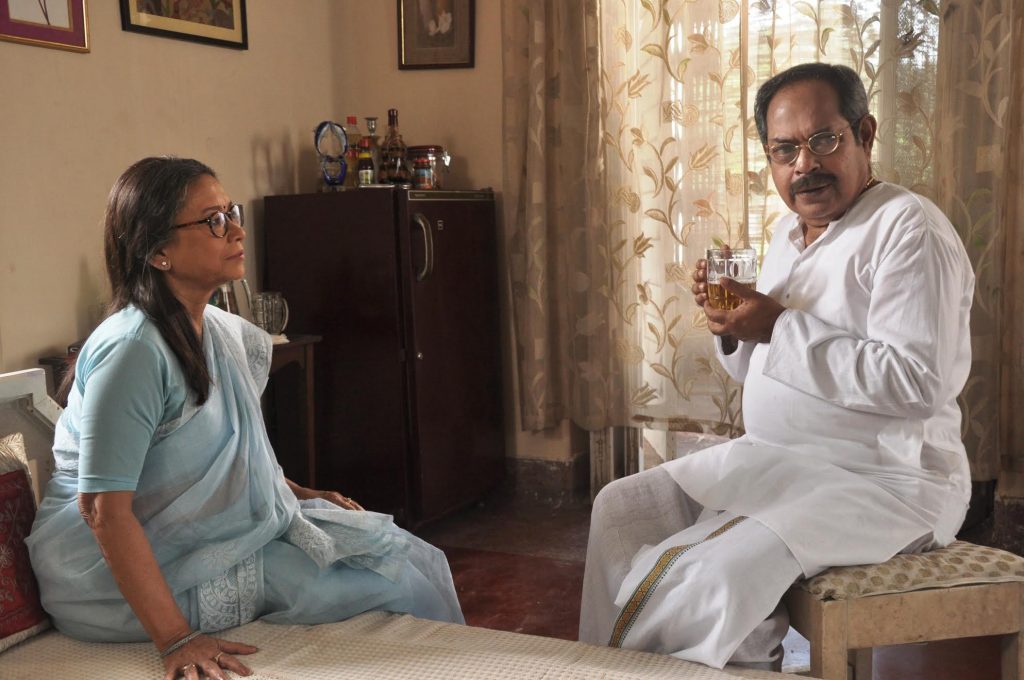Benche Thakar Gaan was the inaugural film at the recently concluded 22nd Kolkata International Film Festival, the first ever Bengali film to open the festival. Directors Sudeshna Roy and Abhijit Guha, who have almost specialised in making youth-centric films, step effectively enough into the fragile territory of a group of random senior citizens in an affluent old age home some distance away from Kolkata.
In Benche Thakar Gaan, like all senior citizens, they find it very difficult to cope with the somewhat erratic and whimsical nature each one of them has. Some kind of harmony is restored with the help of Paromita Sen (Gargi Roy Choudhury), a highly qualified psychiatrist who takes up a job in this home to counsel the inmates. This, under the supervision of the old age home’s stiff-upper-lip, strict disciplinarian, Dr Partho Sinha (Tota Roy Choudhury), who decided to set up this home after a long stint as a medical specialist abroad. Paromita has a back-story to support her sudden decision to leave her plush job in Kolkata and come here. Partho too, has his own reasons for being so grave, severe and autocratic. But that is just the surface of the ocean. The real merit of the film lies in the inmates of the home. Not all of them have decided to strike tent here because their children do not look after them. Nor are all of them married with families of their own.
The ambience within the real old age home is created beautifully. The sub-plots are revealing and so is Dr Sinha’s back story. The dialogue is pithy, filled with layers of humour, sarcasm, good cheer and some sad nostalgia. The music is just right with one of the inmates (Ardhendu Banerjee), belting out a beautiful Tagore song during his interaction with the old man who tried to touch the maid inappropriately. Each actor stands out which makes in unfair to rank their performances in any order of merit. It does not matter whether it is Dwijen Banerjee as the dyspeptic husband or the man (Pradip Mukherjee), who does not talk to anyone and keeps loitering in the garden hoping for news of his family lost in a landslide. Another old bachelor has been forced to take shelter in the home because his nephew threatened to kill him! It is the spontaneous cheer and natural counselling that Paromita exudes that brings these inmates back to life, singing away, reciting Tagore, drinking on the sly, and even rehearsing for a Tagore play much to the consternation of Dr Sinha.
Each senior character, drawn from among the best in Bengali cinema among veterans in the industry, is fleshed out beautifully by the script and the directors. They have been able to draw outstanding performances from all of them. Anamika Saha, completely wasted in melodramatic, negative roles in mainstream cinema, comes out with the best performance of her career. In this film, she is always overly made-up, dressed and bejeweled but is constantly at loggerheads with her husband (Dwijen Banerjee), who has a bad digestive system. Another beautiful lady – and a top actress once (Indrani Bhattacharya) – prefers to keep to herself because she has not been able to strip herself of the alienation stars are conditioned to. A third woman (Sohag Sen) buys hard drinks on the sly and includes other old men and women within her closed world, unknown of course, to Dr Sinha. Another inmate (Paran Bandopadhyay), the oldest of them all, has a keen eye for young women and tries to take advantage of one of the maids (Damini Basu) who raises a big hue and cry but later adds, “You could have just asked me. I would have given you all,” shedding light on the tender relationship that can evolve between and inmate and a fourth class staff.
Pravatendu Mandal’s cinematography and Sudip Dutta Ray’s editing fits neatly into the mood of the film but the running time could and should have been clipped by around 15 minutes to sustain the intensity of the story. Finally though, for such a strong narrative with well fleshed out characters, Benche Thakar Gaan has a rather melodramatic twist in the end, which offers a disappointing contrast to all that has gone before. This brings a powerful statement on life lived on borrowed time to a rather tame end, letting down the film in the process.
Bengali, Drama, Color


